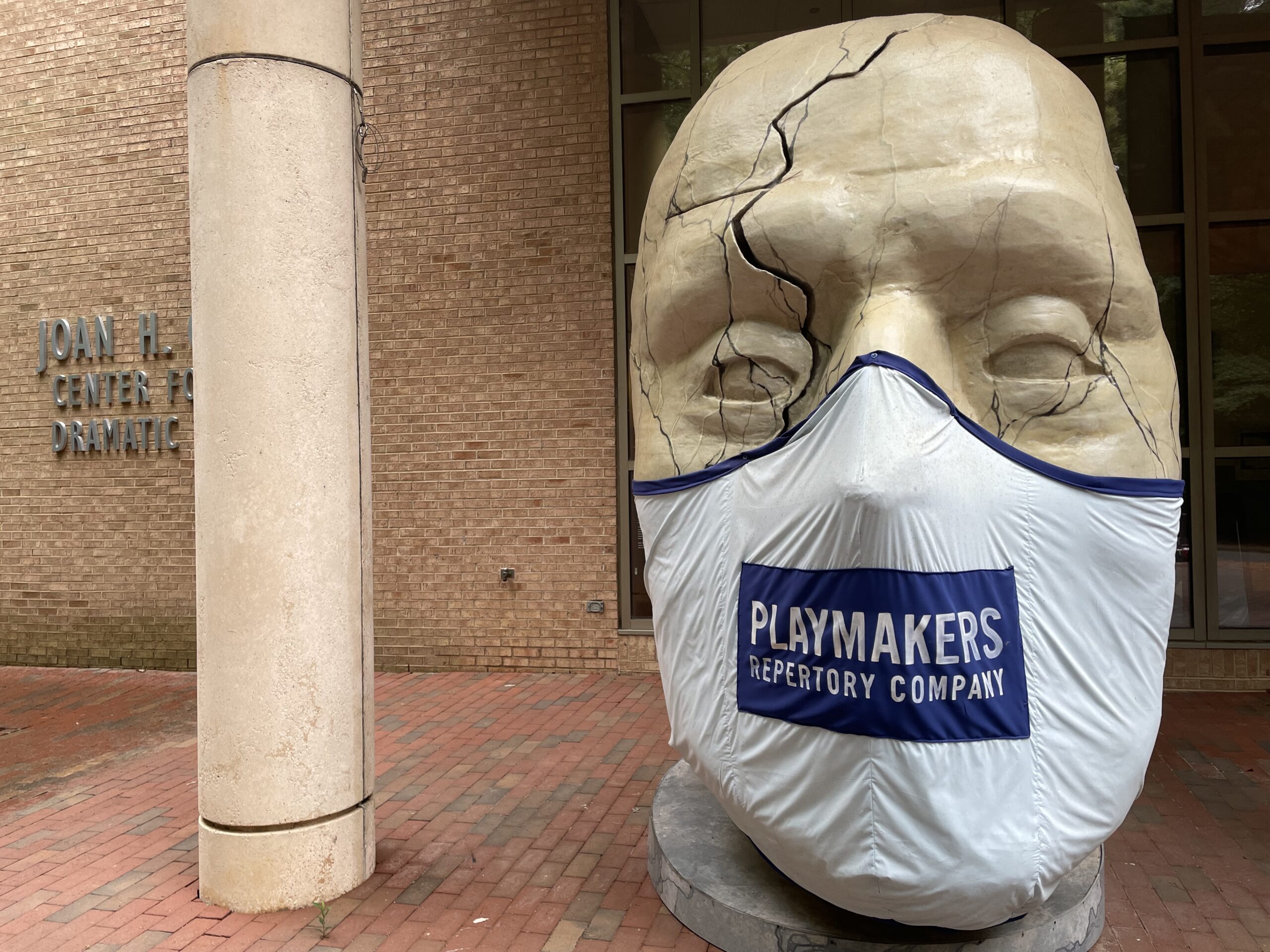You still have about a week to head to PlayMakers Repertory Company and catch their latest production, “We Are Proud To Present…” by Jackie Sibblies Drury. (The full title is a lot longer.) It’s a powerful experience: insightful and meaningful, simultaneously funny and gut-wrenching, written and staged in a way that’s probably unlike any play you’ve seen.
I saw it a couple days ago and I’m still ruminating on it. Here’s the plot in a nutshell, to the extent that there is one: we open on six actors, three white and three black, who are in the process of developing a play (sorry: a “presentation!”) about a forgotten historical atrocity, the early-20th-century genocide of the Herero people by German colonizers in southwest Africa. (A “rehearsal Holocaust”? No, dude, an actual holocaust.) Knowing their limitations, the actors want to tell the story as realistically as possible, using only the words and experiences of the actual survivors – but all they have to work with are letters written by the German soldiers. Are we just telling yet another story about white people, with the victims pushed to the back as setpieces? What if we look inside ourselves for inspiration? If we do that, won’t we just end up talking about American racism, with the Herero forgotten? Is there any way of avoiding that in the first place? Is that enough?
(Most plays, when you describe the plot, you talk about one event followed by another. In this play, the plot is one new question following another.)

Photo by Jon Gardiner via PlayMakersRep.org.
I want to get the word out about this play now because…well, if you’re not a theatergoer, this has been happening right under your nose without your knowing it, but for the last year now, PlayMakers has been having a really incredible run of plays that speak directly to today’s headlines with remarkable specificity.
I think it started last year with a play called “An Enemy of the People,” which basically called the Flint water crisis six months before it hit the news. A perfectly well-meaning but ultimately self-serving businessman tries to cut costs and inadvertently winds up poisoning a town’s water supply; political and cultural leaders are in cahoots with the business leader, so they look the other way; and the whistleblower who tries to warn people is demonized and ostracized. (Presumably not long after the play ends, the town is forced to admit the whistleblower had been right all along, at which point Play Marco Rubio gets up and delivers a speech about how it’s not nice to point fingers.)

Anthony Newfield as Peter Stockmann and Michael Bryan French as Thomas Stockmann in “Enemy of the People.” (Photo by Jon Gardiner via PlayMakersRep.org.)
Then this season began with a taut little show called “Disgraced,” which just so happened to hit the stage at the exact moment Donald Trump started winning polls and the Syrian refugee crisis became a cover story. A New York lawyer, Pakistani by birth, denies his heritage and rejects Islam as a backwards faith – but he still winds up losing a promotion, losing his friends, losing his family, and losing his job when he speaks up for an imam who’s being unjustly persecuted. (And how much has he really renounced the “backwards” side of the faith?) “Disgraced” was a hit-or-miss show for me, but there’s a dinner-party scene I still think about, so smart and complex and well-staged and powerful…and the title of the show is endlessly fascinating. “Disgraced.” The main character is “disgraced” by the end, but at what point does he become “disgraced”? Is it at the end of the dinner party when he reveals his ugly side? Is it when he speaks up on behalf of a social pariah? Is it when he first denies his heritage? Nope – as far as white America is concerned, he’s actually “disgraced” before the play even begins. If your background is Middle Eastern or Muslim, Americans will assume you’re a potential terrorist unless you prove otherwise – it’s our default setting – so it’s not enough to deny your heritage, you have to acknowledge and loudly denounce it, or else you’re automatically suspect. (If you just deny it, then, gosh, you’re hiding something. What are you trying to hide?) All of this played out on stage in Chapel Hill while, at the same time, just down the road, our own governor was standing in front of the cameras proudly refusing to accept any more so-called “refugees” because golly gosh, how do we know they’re not secretly terrorists? The timing was impeccable.
And now we have “We Are Proud to Present,” which is playing on stage right now – even as Donald Trump encourages his supporters to assault black protestors at rallies across the country – and even as the facts are still coming in about yet another police shooting. (We shouldn’t judge individual cases until all the details are in. We should be conscious, though, that statistically blacks and whites get treated differently, not just ‘somewhere else’ but also right here, not just by police but by society as a whole, not just by other people but also by ourselves.)
If you’ve been keeping up with PlayMakers recently, you already know what I’m talking about.
If you haven’t been following them – well, it’s worth being aware. They’ve been incredibly prescient lately, when it comes to choosing plays. Their shows always hit the stage right when the relevant issue becomes especially salient. It’s an uncanny talent.
Why am I mentioning this now, you ask?
Their next show is “Sweeney Todd.” Don’t switch your stylist.
“We Are Proud To Present…” runs through Sunday, March 13. Click here for ticket info.



